FROM MALDIVES TO TURKEY
We did decide to ship Passage from the Maldives to Turkey, but we did not make this decision lightly. It was a difficult decision, it cost an obscene amount of money, and it was a huge disappointment to us. We were both surprised that it was such an emotional experience as well. A difficult time for us.
As we planned this part of our journey, we followed the piracy situation in and around the northern Indian Ocean. For reasons we do not understand, there was a dramatic increase (825%) in attacks on commercial vessels in January, 2011 compared to January, 2010. The attacks also spread well east and south of the heavily patrolled corridor through the Gulf of Aden. In prior years, the Gulf of Aden has been the danger area. Now, the entire northern Indian Ocean is dangerous. However, despite this increase, a sailboat had not been attacked in this area in six years. We based our false sense of security on this six year stretch, and then SV Quest was attacked.
SV Quest is a 58’ American-flagged sailboat on an itinerary similar to ours. We do not personally know the owners – Jean & Scott Adams – but they were in Sri Lanka’s Galle harbor a few weeks ago when we were there, and we shared a dock with them as recently as Phuket just over a month ago. They had two additional crew on board.
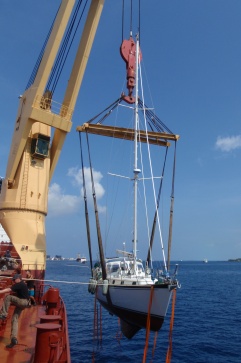
Crane lifting Passage from water
They were seized by pirates on February 18 at 1323 UTC. Their position was 18°00’N /061°02’E. They were approximately 240 miles off the coast of Oman. They had taken a course similar to our planned course
This was an immediate game changer for us. We knew immediately that we would not sail through this area. What to do?
We discussed three options available to us. First, we could sail south and reach the Atlantic via South Africa. Second, we could return to Southeast Asia. Third, we could load Passage on a freighter and ship her to the Mediterranean. We did not want to go south, and we did not want to return to Southeast Asia, so we decided on the latter – to ship her.
This was not a creative decision. We were aware that numerous cruising boats had made this same decision, and we knew that Seven Star Shipping would have a freighter in Male, Maldives soon to load those other boats. We had to make our decision quickly, and we hoped that space was still available.
This was a huge decision for us. We were deeply disappointed that we were being forced to change our plans. We had put so much effort in to making this part of the trip possible, but it just did not appear safe to proceed. It is also obscenely expensive, but such is the price of continuing our journey. If we did not continue on, we would feel as though we, too, had been pirated to a lesser degree.
We gratefully obtained information about the shipping option from another boat in the Uligan anchorage. They gave us contact information for the person organizing this, and we made contact by e-mail. We were relieved that there was space available to carry Passage from Male, Maldives to Marmaris, Turkey.
Our shipping agent was Seven Star. They have a long history of shipping boats of all sizes, and they expressed a willingness to work with the boats in India and Maldives that had decided against sailing through the pirate-infested waters. The boats in India were asked to sail to the Maldives for loading, and we were given a ‘soft’ loading date of only a few weeks off.
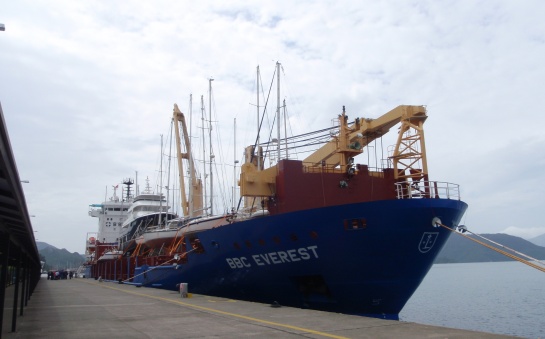
BBC Everest at dock in Marmaris, Turkey
Unfortunately, communication problems and delays began almost immediately. Seven Star had problems getting a ship to us, and many of us felt that they were less than forthcoming about the inevitable delays this would cause. We were not troubled that there were delays. We were troubled that we were not kept informed as those delays developed. But eventually – almost a month after first expected – a ship did arrive. The BBC Everest – a new ship on her maiden voyage.
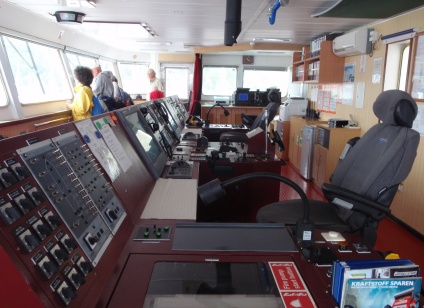
Bridge on BBC Everest
We were aware that there are often 30 knot head winds in the Red Sea, and when combined with a ship’s forward velocity of approximately 20 knots, we had to prepare Passage to endure 50+ knots of wind. We removed all canvas, we skied our halyards, and we covered all moving bits (winches, windlass, furlers, etc.) with plastic. Everything that could go below went. She had not been this bare since our hurricane threat in Vanuatu in 2006.
Seven Star had sent their load masters to Male a few days before the ship arrived, but they made essentially no effort to communicate with us. They did not even have a VHF radio with which they could contact the boats. A few of the cruisers would repeatedly call the load master until they got the information they wanted, then that info would be spread via radio among the boats in the anchorage. We, and all but a few of the other boats, thought that this was very unprofessional.
But there were sixteen boats to be loaded, and we had to try to keep moving forward. We were finally told that a loading plan had been developed, and Passage would be the first to be loaded on April 10. So we gave away all our refrigerated food and packed up the dinghy. Then that plan changed, and we were number five.
But loading did begin on April 10. Unfortunately, the ship was at anchor, rather than at a dock, and there was a bit of swell running. Local boats were also circling around the ship to see what this odd spectacle was, and that increased the surface motion. The first two boats to be lifted by the crane were swinging – wildly at times – above the ship’s deck, and it was dangerous lowering them on to their cradles. Only two boats were loaded that day.
The seas were calmer the next day, and three boats were loaded including Passage. However, there was still enough motion that the boats were spaced far apart on deck rather than closely. We did not see any way that they could fit sixteen boats on that ship as they were currently being loaded.
The captain talked with the port captain, and he was able to move the ship to a small island a few miles away and tie up to a dock. The dock provided the stability to load the remaining boats more safely and closely. They also refloated and moved Passage while at the dock. We did not know this until the ship arrived in Marmaris, and she was not where we left here.
It was very difficult leaving Passage on the ship that day. We left knowing there was a possibility – albeit small – that we would not see her again.
We flew to Istanbul on Tuesday, April 12. The Everest was still loading boats. They loaded for another few days before finally squeezing them all on.
We learned a few things about the transit only after the Everest arrived in Marmaris. We learned that the captain told the Male port authorities that he had changed plans, and he was headed for South Africa rather than the Red Sea (this was in case someone in the port captain’s office was providing information to pirates). And when the Everest left Male, she did, indeed, head southwest until well out of radar range. Then she turned off all lights and AIS tracking data and changed course for the Red Sea.
The Everest had four mercenaries on board (an increasingly common practice on ships) that she had picked up off-shore Sri Lanka. Her stern was wrapped with razor wire to deter boardings.
Her passage was 3,866 miles, and it was relatively uneventful. She hit only one sandstorm in the vicinity of the Suez Canal, but she had otherwise good weather.
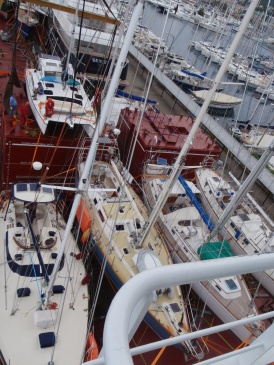
Deck as seen from bridge of Everest
The Everest arrived off-shore Marmaris after dark on April 28, and she held off overnight. She steamed in to the bay carrying her precious cargo early morning on April 29. The ship and all its cargo had to be cleared in to the country before any boats were off-loaded.
Passage was merely an item of deck cargo – “just like a refrigerator” we were told – to the Turkish officials, so she had to be imported as such. This required an agent with some experience. The first agent we contacted, whom had been recommended by Seven Star, was a disaster. However, Bill on SV Bebe found an agent with whom we were all very pleased – Soner Yaman at Marmaris Marine Yachting & Shipping. Soner’s efficiency enabled us to start off-loading very shortly after the ship’s formalities were completed, and a few boats were off-loaded on the 29th. The plan was to finish off-loading on the 30th.
The crew started early on the 30th, but after off-loading a few boats, a thunderstorm blew in. One of the boats just off-loaded, Slapdash, was hit by lightening within an hour of being off-loaded, and they lost all their electronics. A few more boats were off-loaded, but the winds and seas were both increasing. The winds had increased to a steady 25 knots by the time they were ready to off-load Passage, and the captain wisely decided to stop for the day. So we were bumped to the next day.
We were off-loaded early on May 1 in calm winds and seas. As we pulled away from the ship, we both felt a huge sense of relief. Bud had an ear-to-ear grin expressing his relief. Nita had buckets of tears pouring uncontrollably down her face. This terrible experience was finally ending.
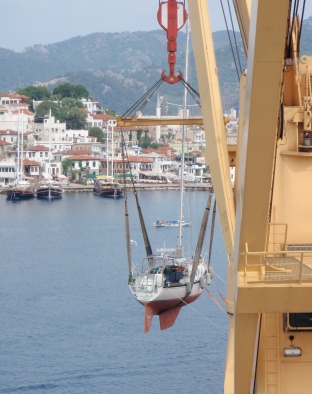
Launching in Marmaris, Turkey
Often, when making difficult decisions, you later second guess your decision and think you might have been better to have made another choice. Not so in this situation. If we had to do it over again, we would make the same decisions. We are still disappointed, and we still cringe at the amount we spent to ship Passage, but we also still believe that we made the right decision.
What if there had been a safe route through the northern Indian Ocean? What would we have found as we passed through northern Africa and the Arab countries?
If we sailed up the eastern side of the Red Sea, through the Suez Canal, and the eastern shore of the Mediterranean, we would have sailed along Oman, Yemen, Saudi Arabia, Jordan, Lebanon, and Syria. Every one of these countries is in political chaos, and some are blatantly dangerous. However, Saudi Arabia specifically prohibits boats from visiting, so we would not have sailed up the east coasts.
If we had sailed up the western side of the Red Sea, through the Suez Canal, and along the northern coast of Africa, we would have sailed along Eritrea, Sudan, Egypt, Libya, Tunisia, Algeria, and Morocco. Again, every one of these countries is in political chaos, and some are blatantly dangerous.
There is no safe route through the pirate-infested waters from the Maldives to the Red Sea. And even if there was, our safety would have been jeopardized as we continued northward in the Mediterranean to Turkey.
Despite our efforts at prudent planning, piracy and political turmoil has created an unsafe situation. It appears that we chose the worst possible time to try to make this passage.
Passage is all cleaned up. Our wallets are a bit lighter. But we are safe, and we are ready to resume our travels. We are confident that we made the right decision for us.
Follow us as we explore Turkey or as we sail in Europe.
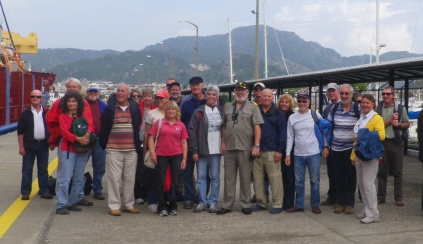
Some very happy sailors!!